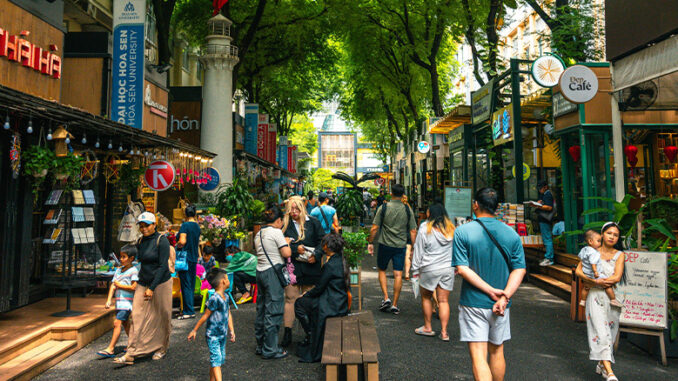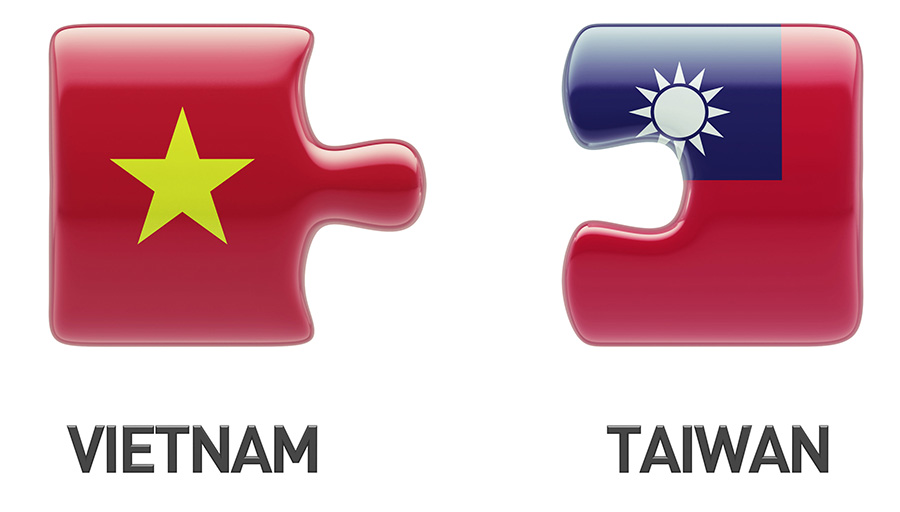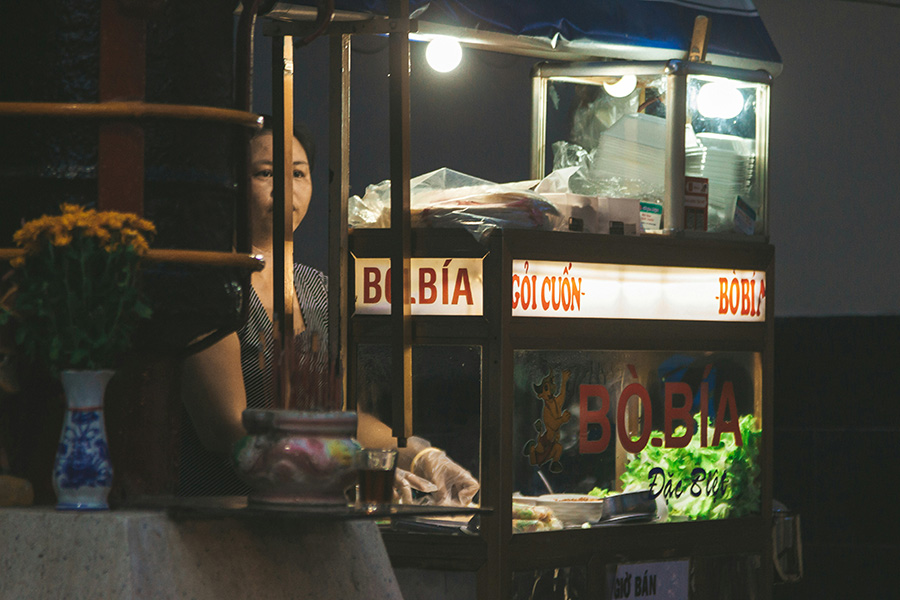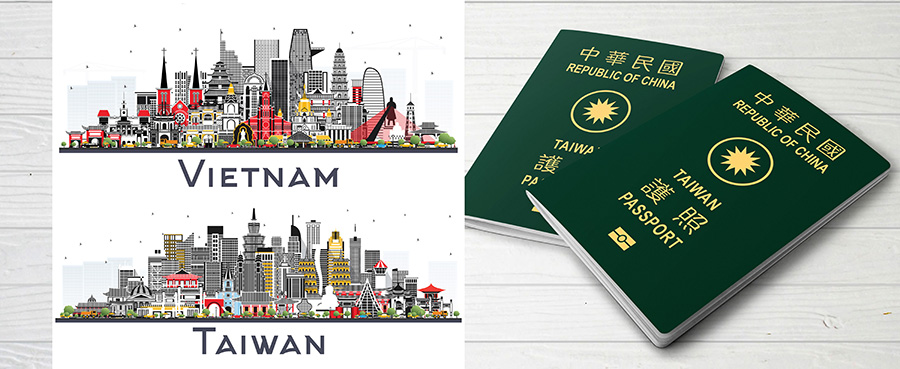
The Vietnamese-Taiwanese family
The participants in this study primarily met their future spouses through work or via introduction (one case through matchmaking services). The Vietnamese women in the sample are highly educated: 11 participants have graduated from high school or higher and only one has a lower secondary education level. They are often proficient in a second language – Chinese, English, or Japanese; some also are Vietnamese of Chinese origin. They also had stable employment prior to marriage. The Taiwanese men in the sample are usually in Vietnam for business and met their potential spouses there.
“In Vietnam, most of the Vietnamese-Taiwanese couples tend to work together before expressing romantic interests and deciding to marry. In Taiwan, in most cases, marriage happens through a matchmaking service. But the Taiwanese men who comes to Vietnam first usually pick a spouse based on romantic interests and the women are very capable of supporting them as partners.” (Female, 51 years old, married for 19 years).
The Vietnamese-Taiwanese multicultural families who participated in this study have dwellings legally under the names of the Vietnamese wives. This act is often seen as the husbands affirming thier trust and affection for their wives and the intention of “settling down” and building a career and life in Vietnam. However, this act is also based on cost-benefit calculations, because banks and companies give out loans only to Vietnamese (comments from Female, 36 years-old, married for 7 years, and Male, 32 years-old, married for 2 years). In the same vein, the Vietnamese wife’s name is often used to conduct business and family transactions relating to the state.
In terms of religion, spouses do discuss before marriage their rights and would agree not to coerce the other into conversion, although conversions were seen.
“I am a Catholic and my husband became Catholic because of our marriage. Before we got married, I asked if he was willing to convert? Back then, he answered straight away that because his family was Buddhist, he would not convert. …. After that, he thought it over and converted. My entire family is Catholic now. Every Sunday we go to Mass. When he is in Taiwan, he goes for Mass by himself.”
Thus, the unions started from a position of equality and represented agency by both sides. Love, respect, and effective communications were placed above but did not exclude economic and material considerations.

Language and Communication
Proficiency in at least one foreign language has given couples a common language in these marriages. (evidence by a Male, 32 years-old, married for 2 years). The Taiwanese spouses in the study, most of whom have lived in Vietnam for 10 years or more, can understand Vietnamese partially or mostly, although few use Vietnamese daily. Concurrently, the Vietnamese spouse’s Chinese proficiency advanced. In addition, the Taiwanese spouse had little determination and confidence to learn and communicate using the Vietnamese language because of learning difficulties. They usually relied on the Vietnamese spouse for translation. (evidence from Female, 51 years-old, married for 19 years).
“My husband has studied Vietnamese, but only simple words like thank you and hello … People often ask why I don’t teach him, but it is impossible, even the teachers couldn’t do it. The first day he refused to study, then he said that he would study with our child in the summer, now that our child can speak 2 languages and he still doesn’t speak Vietnamese” (Female, 36 years old, married for 7 years).
Language preferences in multicultural Vietnamese-Taiwanese families are thus: Chinese between husband and wife, and father and child. For the mother and child, the mothers speak in Vietnamese and the children respond in Chinese or Vietnamese. Some families also use Chinese exclusively for daily communication, leading to their children gradually losing Vietnamese proficiency over time, enforced by attendance at international schools where the main language of instruction is not Vietnamese. (Notes from Female, 36 years-old, married for 8 years, and interviews with students from the Taipei School.) A language disorder in young children may occur in the families when they simultaneously learn two, or even three, languages too early.
“In its first 24-25 months, my baby communicated only by head gestures. I was also afraid that they had developmental problems. Hearing that my family was bilingual, the assured me that the children will emerge speaking well and quickly they have decided on a language to use.” (Female, 51 years-old, married for 19 years
Language proficiency have also become obstacles in communication within the family. Extended family members may have difficulties communicating across culture, and couples may have cultural misunderstandings due to obstacles. (Male, 32 years-old, married for 2 years).
Thus, the language of communication in multicultural Vietnamese – Taiwanese families in Ho Chi Minh City depends largely on the language proficiency of the couple. Most Vietnamese wives tend to be better at Chinese than Taiwanese husbands at Vietnamese, so communication between husband and wife is predominantly in Chinese. The language use of children in Vietnamese-Taiwanese multicultural families is more varied, being determined not only by the parents’ language ability, but also by the child’s learning and living environment.

Cuisine
Household food choices illuminate families’ decision-making process and cultural preferences.
Food culture is easy to practice but gaps among cultures may be difficult to negotiate, given conditions such as the the living environment, the family’s eating habits, and individuals’ preferences. Our research found that in Vietnamese-Taiwanese families of Ho Chi Minh City, two or more food cultures coexist and practices follow pre-existing preferences. But joyfully, families believed in eating together.
“Depending on who is cooking for the day, I would make Vietnamese food and my wife would make Taiwanese food. We follow our strengths and tastes, which can vary and are also adjustable and adaptable.” (Male, Vietnamese, 55 years-old, married for 23 years).
Cultural differences therefore meet and coexist. Some boundaries could not be crossed, such as the Taiwanese spouses do not eat the “national” (fish) sauce, and very few Taiwanese spouses enjoy the Vietnamese balut, a common snack in Vietnam made from a duck’s fertilized developing egg embryo. There are also differences between sweet and savoury, and ways of cooking and preparation. (Male, 46 years-old, married for 7 years).
We therefore see within the dining habits of multicultural Vietnamese-Taiwanese families, there is diversity, adaptation, conflict, harmonization, mutual respect and concessions between family members.

Nationality, citizenship and perception of origin
Differences in social and political contexts and individual national policies have engendered differences in the roles and status of spouses within Vietnamese-Taiwanese multicultural families living in Ho Chi Minh City.
For a foreigner married to a Vietnamese resident in Vietnam, the right of residence is completely dependent on paid employment (through the company) or on family dependents’ pass (their spouse). Usually “the company takes care of everything”. However, visa troubles creep in when families are not keenly aware of the nuances of switching between types of visas, such as when the switch is from family dependent to business or employment visas (when their work changed). In the study, Vietnam’s visa policy was seen by members of multi-cultural families as causing many difficulties and disadvantages for foreign spouses residing in Vietnam.
Children of multicultural Vietnamese-Taiwanese families in Ho Chi Minh City can obtain both Vietnamese and Taiwanese citizenships, if their parents’ marriage is legally registered with both governments. Dual citizenship offers many benefits, for example, even if the child resides outside of Taiwan, they would still receive subsidies/support during the recent covid-19 epidemic, study allowances for attending the Taipei School in Vietnam, as well as other child support policies from the Taiwanese government. The dual-citizenship children who participated in the study do not identify as a citizen of both states when asked, but rather tailor their answer depending on how much benefits they would receive for their answer.
“In general, the welfare in Taiwan for the elderly and children is very good. My two children, they barely receive any support in Vietnam, but the Taiwanese government is currently giving each child a support allowance of NT$5,000 per month. During the epidemic, in Vietnam, they received a stipend of 1 million each, while the Taiwanese government gave about 8 million VND.” (Female, Vietnamese, 36 years-old, married for 8 years).
Additionally, welfare policies for the foreign spouses residing in Vietnam is fewer compared to those for foreign spouses residing in Taiwan. However, Vietnamese spouse have had to exert effort, through frequent travelling, to maintain links and qualify for schemes of nationality related to residence and other rights.
“Taiwan considers the Vietnamese bride to be Taiwanese if they live in Taiwan. But even if a Taiwanese person married a Vietnamese person and lived in Vietnam for many years, they still won’t be recognized by Vietnam at all, they do not consider the Taiwanese as Vietnamese” (Male, 46 years-old, married for 7 years).

Conclusion
This and the previous paper focused on Vietnamese-Taiwanese multicultural families, consisting mostly of Vietnamese wives and Taiwanese husbands, who chose to live in Ho Chi Minh City instead of Taiwan. The study overviewed the status, number, geographical distribution, context of family formation, and of some of the potentially prominent aspects of multicultural family life, which included: language use and communication patterns, cuisine choice, and nationality and citizenship.
The study found that the number of multicultural Vietnamese-Taiwanese families living in Ho Chi Minh City today is not insignificant and has an upward trend. These families reside most in District 7, District 1, and Thu Duc City. Most Taiwanese men in the sample came to Ho Chi Minh City to work, and happened to meet and became romantically involved with their current partners through an organic process rather than through commercial matchmaking; this implies that romantic connection played a larger role in these relationships’ formation than economic or material considerations. In the family, the Vietnamese spouse tends to be more proficient in Chinese compared to the Taiwanese spouse’s proficiency in Vietnamese, so communication in multicultural Vietnamese-Taiwanese families in Ho Chi Minh City follows a certain pattern with Chinese being used between the spouses, as well as the children and the Taiwanese spouse, and with Vietnamese being used between the Vietnamese spouse and children. Children in multicultural Vietnamese-Taiwanese families have the potential to become proficient in up to three languages: Vietnamese – Chinese – English; the level of proficiency and use in daily communication depends on the environment, be it in familial or educational settings, in which their language skills are required. Multilingualism in multicultural families also create unique challenges, for example, the lack of insightful understanding of aspirations and complex emotional needs among some couples due to the language barrier, or the language confusion in children of multicultural families. In addition to language, cuisine choice, a routine activity, can become a catalyst for a host of process such as conflict, acculturation, harmony, mutual respect and concessions among family members. In addition, for Taiwanese married to Vietnamese living in Ho Chi Minh City, if they do not convert to Vietnamese citizenship but desire a long-term residence, they will become entirely dependent on their place of employment or their wife and children to become guarantors of their visa. Children born into legal multicultural families are mostly entitled to dual citizenship, however, their awareness of their own citizenship is not one of dual identities; instead, they practice a selective identification depending on the context and a value maximization strategy.
Phan Thi Hong Xuan, Ho – Hsien Chen, Vo Phan My Tra
The authors are Phan Thi Hong Xuan (University of Social Sciences and Humanities – Vietnam National University Ho Chi Minh City), Ho-Hsien Chen (Taipei Economic and Cultural Office in Ho Chi Minh City), and Vo Phan My Tra (University of Leipzig, Germany). All enquiries should go to email: xuan.pth@hcmussh.edu.vn
Acknowledgement: This research is funded by the Vietnam National University Ho Chi Minh City (VNU-HCM) under grant number B2022-18b-04
Banner: Ho Chi Minh City, Saigon, Socialist Republic of Vietnam – the book shop street near the post office. Photo, dotmiller1986, Shutterstock
